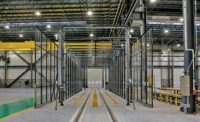ENR New England Celebrates Region's Best Projects
Judges honor 15 New England projects for outstanding construction, design

‘Chord,’ a sculpture by British artist Antony Gormley, was installed in a stairwell at MIT’s mathematics building.
PHOTO BY PETER VANDERWARKER
From the renovation of one of the nation’s oldest subway stations to a “cellular polyhedral sculpture” created by a British artist, the winning entries in this year’s ENR New England Best Projects competition displayed impressive breadth. But as inspiring as the fully accessible Government Center station in Boston and Antony Gormley’s sculpture at the Massachusetts Institute of Technology are, the other 13 winning projects this year are equally impressive. Four industry professionals served as our judges, including a separate safety specialist who selected one of our most important honors, the Excellence in Safety Award.
Judges evaluated entries according to the following criteria: the ability to overcome challenges; the project’s contribution to the industry and community; safety; and construction and design quality. They reviewed and discussed 24 projects located throughout the region, which includes Connecticut, Maine, Massachusetts, New Hampshire, Rhode Island and Vermont. The projects had to be completed between May 1, 2015, and June 30, 2016. For each category, the judges could award a Best Project-level winner and as many award of merit honorees as they deemed worthy.
One category the judges found particularly appealing was energy/industrial, where they handed out a Best Project award to the Interstate Reliability Project in Wallingford, Conn., and awards of merit to the Passadumkeag Windpark in Lowell, Maine, and the Rehoboth Landfill solar project in Rehoboth, Mass.
The Interstate Reliability Project, which also won the Excellence in Safety Award, required contractors to install 37 miles of 345-kilovolt overhead transmission line, while the project team for the 40-MW Passadumkeag Windpark engineered, procured and constructed the wind farm, substation and cross country transmission line. The Rehoboth Landfill solar farm includes 3,200 solar panels that produces 1,300 kilowatt hours per month.
The Grace Farms River Building was selected as the overall Project of the Year. With five main buildings enclosed by curved glass walls and connected by one roof, the New Canaan, Conn., project blends into its natural surroundings. The project—designed by Pritzker Prize-winning Japanese architecture firm SANAA—includes a customized aluminum rainscreen with a Douglas fir underside.
- Project of the Year New England, Best Cultural Worship - Grace Farms River Building
- Government/Public Best Project - Waterbury State Office Complex Redevelopment
- Excellence in Safety Award and Best Energy/Industrial - Interstate Reliability Project
- Energy/Industrial Award of Merit - Passadumkeag Windpark
- Energy/Industrial - Rehoboth Landfill Solar
- Green Project Best Project - Community Arts and Sciences Building, Common Ground School
- Health Care Best Project - Building for Transformative Medicine at Brigham and Women’s Hospital
- Higher Education/Research Best Project- Novartis Cambridge Campus
- Renovations/Restoration Best Project - Government Center Station
- Renovation/Restoration - Award of Merit - Uniqlo - Faneuil Hall
- Highway/Bridge Award of Merit and Award of Merit Safety- Kenneth F. Burns Memorial Bridge Replacement Design-Build Project
- K-12 Education Award of Merit - North Reading Middle/High School
- Specialty Construction Best Project - Anthony Gromley Sculpture Feabrication & Installation
- Water/Environment Best Project - Sutton Brook Disposal Area Superfund Site Remediation
- Water/Environment Award of Merit and Award of Merit Safety - T.F. Green Airport Diecer Management System


-09.jpg?height=200&t=1667938251&width=200)
